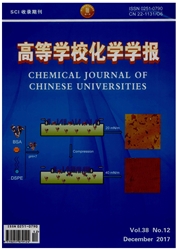

 中文摘要:
中文摘要:
利用微量热计MicroDSCⅢ对重金属离子影响脲酶催化水解反应的过程进行研究,并探讨重金属离子联合抑制作用对脲酶催化反应的影响.结果表明,在25℃下,重金属离子对脲酶水解反应热有影响,在广泛浓度范围(0.1,1,10,100和10^3mg/L)内,这种影响不仅表现在抑制作用方面,而且会促进其水解反应的进行,如铜离子在100和1000mg/L时抑制率分别为(0.49±0.20)%和(-11.93±1.34)%.重金属离子浓度与抑制率具有显著或极显著的相关性,抑制效果的顺序为砷离子〉铅离子〉镉离子〉铜离子.当重金属离子联合抑制时,其抑制效果与抑制率较高的重金属离子的抑制作用接近.
 英文摘要:
英文摘要:
Inhibiting effects of heavy metal ions on urease-catalyzed reaction were investigated with microcalorimetry. Further, the joint inhibition effects of two heavy metal ions on urease-catalyzed reaction were also conducted. The results indicate that, with a wide range of concentration(0. 1, 1, 10, 100 and 103 mg/L), heavy metal ions not only inhibit urease hydrolysis reaction, but also can promote this reaction in some concentration range. For instance, inhibition rate is (0. 49±0.20) % and (-11.93±1.34) % when Cu2+concentration is 100 and 1000 mg/L, respectively. The correlation between urease inhibition rate and concentration of heavy metal ion is very significant, and the inhibition effects are: As3+ 〉Pb2+ 〉Cd2+ 〉Cu2+. The joint inhibition is close to that with higher inhibition when two heavy metal ions are used together. This work proves that the micro-calorimetry may be a potential method to rapidly and accurately detect heavy metals.
 同期刊论文项目
同期刊论文项目
 同项目期刊论文
同项目期刊论文
 Effects of micro-particle diameters and low fluid velocities on effective thermal parameters of micr
Effects of micro-particle diameters and low fluid velocities on effective thermal parameters of micr Experimental research of fluid flow and effective thermal parameters in micro-particle packed bed as
Experimental research of fluid flow and effective thermal parameters in micro-particle packed bed as 期刊信息
期刊信息
